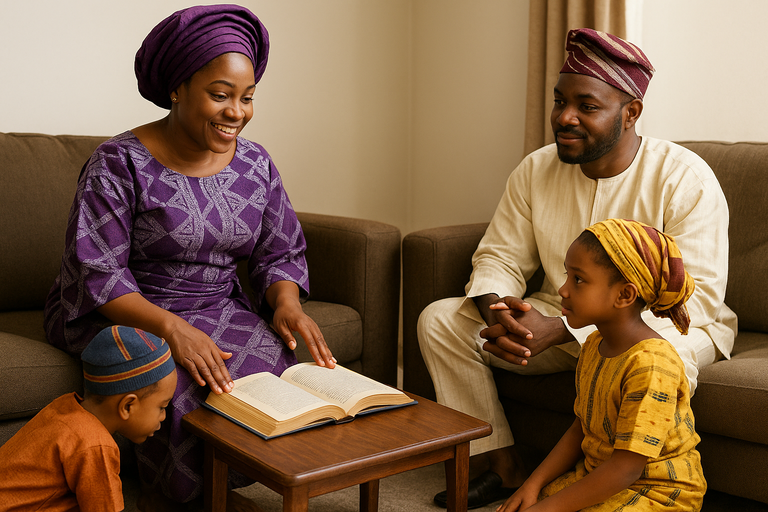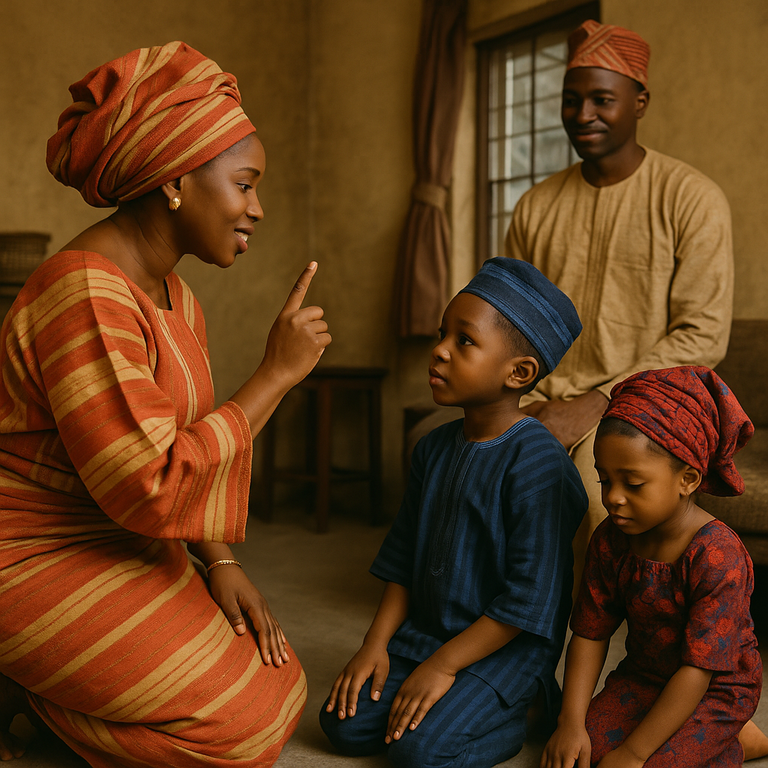"Why Our Children Must Know Their Yoruba Heritage/Roots."

[Image generated from Meta Al]
Good day, people of Hive! Welcome to my blog. Today's topic is from Hive-Naija, so let's dive in.
As a Yoruba by tribe, one of the things that makes us special and unique is our culture, tradition, food, greetings, dressing, and also the way we raise our children because all these I mentioned carry deep meaning. Nowadays, especially children from this modern generation, are growing up speaking only English, which is not our language. English is just a borrowed language that we got from the British. And because of this, our children nowadays don't know how to speak their language. Instead of them eating their native food, they eat fast food. Instead of dressing in their native wear, they dress as if they are from abroad, and the saddest part is that they know little or nothing about their roots, which is not supposed to be. So, the question now is, how much of our Yoruba culture should we pass to our children?
To be honest, I think we should pass as much as possible, but with understanding and balance. Yoruba culture is not just about tradition; it’s about respecting our elders, how to live with our family, and also good morality. So imagine if we are to throw all these away, what will our children stand on? So let’s break it down.
Language:
Language is one of the things we must pass down to our children. As a Yoruba person, I am proud to say our language is sweet, rich, and full of wisdom. In Yoruba, we have a lot of proverbs, and one example is "Ti ọmọde ba ṣubú a wo iwájú, ti agbalagba ba ṣubú a wo ẹyìn" (When a child falls, he looks forward; but when an elder falls, he looks backwards), which means when a child makes a mistake or faces any challenges, they look ahead to keep going. But when an elder faces any difficulty, they look back to reflect on the past actions or the decisions they made that may have led to the fall. We all know how important English is nowadays, but if our children speak English in school, let us make sure they speak our language at home and make them understand how important our language is. Even if we are speaking English to them, let us make sure they reply to us in Yoruba because if we allow them to speak our language, they already carry a strong part of their identity. For example, in my department, I have four Yoruba coursemates who can't speak or understand Yoruba, which gives some of the Yoruba students the privilege to insult them in Yoruba. The only way they can understand is when we interpret for them, which is not supposed to be.
Respect for Elders:

[Image generated from Meta Al]
This is also one of the most important things in Yoruba culture. Let us make sure we teach our children how to respect their elders and let them understand that whenever they want to greet an elder, the male should always prostrate while the female should always kneel to show respect, and they must speak respectfully. They should never call their elders by name; rather, they should call them “Sir” or “Ma.” The respect should be there. Let us teach them all these things. Even if they grow up and they are not with us and are living far away, the teaching will still be there because they are already practicing it from a young age, which will no longer be a problem for them. If people see a boy prostrating and a girl kneeling down, they won’t think twice before they know that they are Yoruba people because this is the way we do it in our culture.
Food and Dressing:
Don’t let our children grow up eating only fast food like noodles, spaghetti, etc. But also teach them how to eat their native food, such as amala, eba, ewedu, etc. For example, I grew up with my grandma, and most of the food we always ate was amala, eba, and all our native foods. Not because we didn’t have any other food at home—we did—but she purposely always let us eat native food so that we would never divert from our culture. Also, let us teach them how to wear our native wear because it's very important. Though not every time, we must balance everything together for them.
Our Values and Beliefs:
Let them know our values and beliefs and how they must always value their family and traditions. Let them know that as Yorubas, we care for each other, support each other, and check up on each other. Let them know that we always care for our family and make sure they are safe and okay. Let them know everything about our culture, what they know and what they don't know.
In conclusion, as Yoruba people, we should pass as much of our culture as possible to our children. Starting with language, food, dressing, etc., just as I mentioned earlier. Since we are in a modern era, let us mix it together for them, and then we will see that we will raise children who can face the world without fear but with confidence, knowing exactly who they are and where they come from.
This is my entry for the Hive-Naija Weekly Prompt Edition 95
Thanks for reading💞💞💞💞💞.
Posted Using INLEO
Congratulations @oluwa-tosin! You have completed the following achievement on the Hive blockchain And have been rewarded with New badge(s)
Your next target is to reach 3000 upvotes.
You can view your badges on your board and compare yourself to others in the Ranking
If you no longer want to receive notifications, reply to this comment with the word
STOPThank you, hivebuzz.
Stay focused @oluwa-tosin! You're making great progress towards your Hive goals.
I actually agree that we should pass our culture as much as possible to our children because that is only the way we can preserve it and as well pass it across generations. If you don't train your child how to speak your language then there is no way he would be able to teach his own children that particular language and it continues like that.
Exactly, you're absolutely right, if we don't pass our culture to our children how will they pass same culture to their children
You nailed it sis... Karo O hire culture is rich, and we can't deny the next generation of this beauty. It will be unfair in our own part.
Yes, it will be unfair if we don't let the next generation or our children to know the roots of their culture or heritage
You nailed it all.
Yoruba is rich in culture and we take it to heart so dearly, especially the greeting aspect.
I'm so determined to pass it down to my children, so help me God 🙏
Yes, in Yoruba culture if a child didn't greet the elderly people the proper way they will point to the child's parents fir not teaching them the way to greet an elderly people. In Yoruba we don't play with our culture because we take our culture to heart and never joke with it.
Yes o, my dear.
We must pass down our culture to our children for them to have a sense of belonging
I love this.
As someone who's passionate about cultural heritage, I believe it's essential for children to know their roots. Language, traditions, and values shape our identity and give us a sense of belonging.
Thanks for sharing, this is wonderful.
🤝